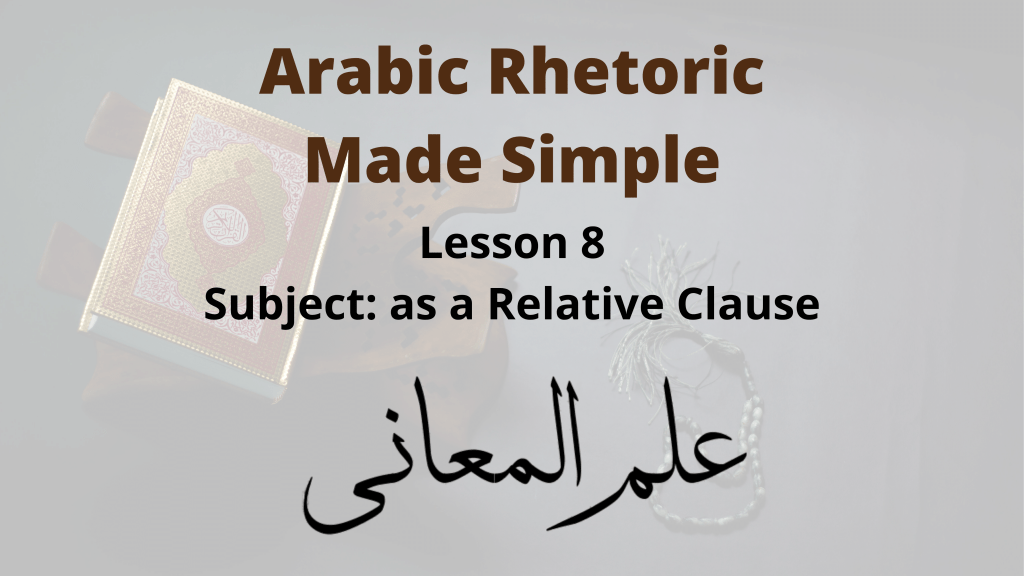In this lesson on ‘ilm ul-ma’aani we are going to learn the benefits of expressing the subject of your sentence as a relative clause, known in Arabic as a موصول/ صلة structure.

The grammar of relative pronouns in Arabic has been discussed in our Arabic grammar series of tutorials. Here’s a quick definition sufficient for the purpose of this current lesson:
Table of Contents
About Relative Pronouns /ism mawsool/ and Relative Clauses /silah al-mawsool/ in Arabic Grammar
In Arabic Grammar, a relative pronoun /ism mawsool/ is a pronoun that introduces a relative clause /silah/ – an entire sentence – in order to relate it to the larger sentence in which it is embedded. In English, these are words like “who”, “what”, “which”, “that”, and so forth. For example, “النجم طمس” (the star dimmed) is an entire sentence, but “النجم الذي طمس” (the star which dimmed) is a phrase in which the embedded sentence “dimmed” is related to “the star” through the medium of the relative pronoun “which”.
Expressing the Subject as a Relative Clause
Before we get started, it is worth mentioning that although the books of balagha call this section expressing the subject as a relative clause, the section is really about expressing the subject using one of the subject’s attributes.
We are not referring to the subject using their name, and we are not referring to the subject using a pronoun, but we are referring to it through an indirect means by using some quality or attribute. Yes, when you refer to something using an attribute, usually you are going to use a relative clause. But not always.

For example, we can say: “The person who works for me…”
- “who” is the relative pronoun. In Arabic we say موصول /ism mawSuul/.
- “works for me” is the clause. In Arabic we say صلة /Silah/.
We can take the same sentence and express it as just “my employee” (by using the title or attribute). Essentially these two sentences mean the same thing. In both sentences, we are referring to the subject using the same attribute. Just expressed slightly differently. Whatever we are going to say about the relative clause in this lesson (first example), also applies to the second example, at least to some extent. So just keep that in the back of your mind.
Reasons for Expressing the Subject Using a Relative Clause
1. The Only Common Knowledge
The first and primary reason for expressing the subject using a relative clause is that the attribute mentioned in the clause is the only piece of information you and your audience commonly know about the subject. Either you, your audience or both of you don’t have any other way of referring to the subject.
For example, I might say: “the woman [whom] you saw me with yesterday was my wife”.
Now the reason I refer to the subject as “whom you saw with me yesterday”, is because you know nothing else about that person. So, I am not able to refer to her using a name or a pronoun or any such thing. I have to use only what we both know.
2. Out of Hatred or Disgust
The second reason for expressing the subject using a relative clause is to avoid referring to it directly out of hatred or disgust. i.e. you are disgusted by the subject so much that you don’t even want to refer to it directly, so you use a negative attribute instead.
For example, a father who has rejected his son might say: “the one who didn’t need his father has come to beg at my door now?”.
The father doesn’t mention his son by name, out of disgust. Instead he mentions a humiliating quality to show his hatred.
3. For Stress
The third reason to use the attribute in the relative clause is for stress.
According to some scholars the stress will be on the purpose and gist of the sentence. Other scholars say the stress will be on the subject itself. Other scholars say that the stress will be on the predicate.
Let’s take a look at all three of these interpretations through an example from the Qur’an. Allah says in Surah Yusuf, talking about Yusuf (peace be upon him) and the governor’s wife Zulaikha, in whose house he was living:

Notice here that Allah didn’t refer to Zulaikha by name or even by her relationship to the governor. He referred to her as: “the woman in whose house Yusuf was residing”.
Purpose of the Sentence
According to the first opinion it is to stress the purpose and the gist of the statement. The purpose here is to show the nobility of Yusuf (peace be upon him).
If a man refused the seduction of a woman off the street, he is considered a noble man. But a man who refused the seduction of a woman in the seclusion of his house where he could have his way with her without anyone even knowing, then he is an even nobler man. So, referring to Zulaikha by specifically mentioning that she was a woman in the house, stresses the nobility of Yusuf (peace be upon him).
Subject
According to the second opinion, the relative clause is designed to stress the subject Zulaikha. If she was mentioned by name or pronoun, someone could argue that this is a different Zulaikha or that she doesn’t live in the same house and so on. The fact that she was mentioned as a woman in his house stresses who she was. i.e. Zulaikha, none other than the one in whose very house Yusuf (peace be upon him) was living.
Predicate
Finally, according to the third opinion, the relative clause is designed to stress the predicate, which is the fact that she tried to seduce Yusuf (peace be upon him). You see, the seduction of a woman off the street is one level of seduction, but the people who live under one roof have an increased familiarity with one another and increased access to one another. So, mentioning Zulaikha as being of the same household stresses the type of seduction she attempted. Because it was coming from someone under the same roof it was of a much higher calibre, thus the predicate is stressed.
Part of the beauty of Allah’s speech is that all three of these preceding opinions and probably other opinions are all simultaneously valid.
To Instil Fear (4th Reason)
The next reason for expressing the subject as the relative clause is to instil fear and awe in to the audience. For example, Allah says:

What enveloped them was the water of the sea, yet Allah has left it completely vague by basically saying that it was whatever it was. Doing this leaves the subject vague and secret. The listener is left wondering. In fact, the listener’s psychology causes him to replace the vagueness with whatever he deems to be the worst possible thing.
People afraid of water will replace whatever enveloped them and imagine a huge tidal wave.
People who are afraid of being lost will imagine an open sea with no land in sight, etc. Leaving it vague relieves the speaker from scaring the audience because each member of the audience scares himself in the way most befitting to him.
Furthermore, because it is being left as a blank for you to fill in, your mind will keep returning back to it. It will keep wondering what is it that enveloped them. The fear of this vague thing continues to haunt the audience.
Also, doing this shows that whatever enveloped them was so awful and fear worthy that nothing you could possibly say would do it justice. So, it is being left completely out. In English this is similar to saying something like: “I did what had to be done”. i.e. what had to be done is so scary that it avoids mention.
To Point out a Mistake (5th Reason)
The next reason for mentioning the relative clause as the subject of your sentence is to point out a mistake to the audience.
For example, you might say to a friend that owns a dog: “That thing you call a pet urinates all over the furniture”.
This statement shows your friend’s considering this animal as a pet is a mistake.
An example of this in Arabic is the following line of poetry, the poet says:

I.e. those who you think are your friends are in fact anything but, and it is foolish for you to think of them as your friends.
Hint at the Predicate (6th Reason)
The next reason the relative clause is used as the subject of the sentence is because it hints at what is coming up in the predicate. For example:

As soon as you hear: “those who are too arrogant to worship Me” in the subject, immediately you know that what is coming up in the predicate is going to be along the lines of punishment or something of that nature.
You see, the manner in which the subject is being expressed gives an indication to what is coming up in the predicate.
7. Allude to Greatness or Inferiority
We are going to build on this idea of the relative clause building up on what is coming up in the predicate. Sometimes what happens is that the indication is used to allude to superiority, or inferiority of something. For example, the poet Al-Farazdaq says:

He is saying that Allah, the One who built the heavens, has built for us a house that is even greater than the heavens, referring to the Ka’bah. Actually, this is an indirect reference to the Ka’bah. Then the Ka’bah is an indirect reference to the dignity which his tribe (the Quraysh) has over all the other tribes of Arabia, because they host the pilgrims of the Ka’bah and so on.
You see here, the poet refers to Allah, not by saying “Allah”, but by saying “The One who built the heavens”.
When you hear the subject being referred to as the builder, immediately, you get the sense that the upcoming predicate will also have something to do with building and construction. Thus, the relative clause in the subject indicates on the upcoming predicate as we discussed previously. But now, this indication is taken further and it is used to bolster the superiority of the predicate.
Think about it, the poet is saying that our house is built by none other than The One who built the very heavens. So then how great must our house be?
Let’s take another example. Allah says:

Here Allah expressed the subject as a relative clause. In the relative clause he mentioned rejecting a prophet, and naturally what you expect to hear in the upcoming predicate is something about punishment and so forth. So again, the relative clause in the subject indicates on the predicate. Now this is used to then bolster the superiority of not the predicate this time, but Shu’eib (peace be upon him). Because if people who reject Shu’eib (peace be upon him) are losers, imagine the superiority of Shu’eib (peace be upon him).
This works for inferiority as well.
To Prove the Predicate by Contraposition (8th Reason)
The last reason we will learn today is very interesting. What happens here is the subject, expressed as a relative clause in Arabic actually proves the claim made in the predicate. Let’s take an example to understand this. A poet says:

The poet is basically saying that: My lover doesn’t love me anymore. He doesn’t express his lover by name, but by saying that she is the one who has migrated away from him.
And the fact that she has migrated away proves that she doesn’t love him anymore.
More precisely, the poets’ premise is that if woman loves man, woman will stay with man. And in his predicate, he is claiming that woman no longer loves man.
In order to prove this, he can just show that woman no longer lives with man. Assuming his premise is accurate, this is a perfectly valid proof, known as proof by contraposition. Or برهان لمي in Arabic.
Indeed, he does show that woman no longer lives with man, in the subject of his sentence. So, since woman no longer lives with man [subject], woman must no longer love man [predicate]. There you have it. He has proven this claim in his predicate, by the relative clause in his subject.
- Proceed to next lesson: Subject: as a Demonstrative Phrase
- Return to index page: Intro to Ilm Ul-Ma’ani
- Start free lessons: Sign Up for Free Mini-class